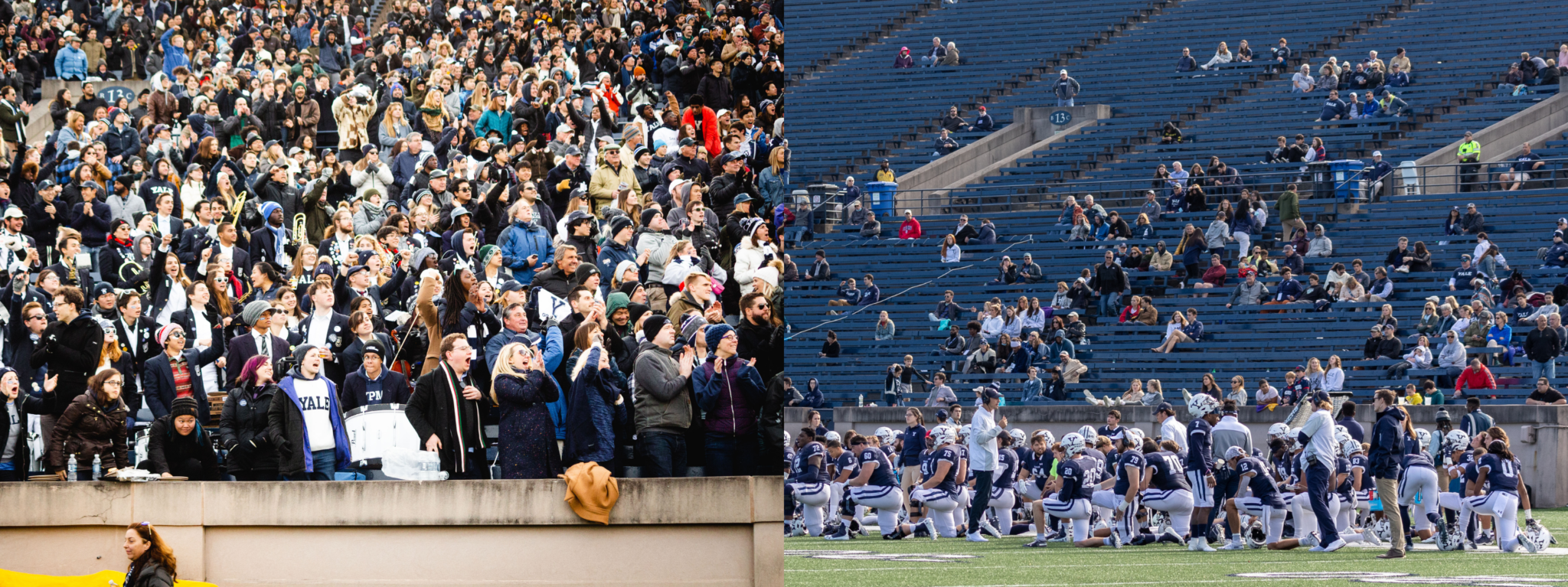Y-H Spissue: Is Yale-Harvard enough?
The Ivy League, though technically a sports conference, is not known for having a throng of athletics fans among its students. Yet, The Game attracts thousands of Yale students every year.

muscosportsphotos.com
Ask the stranger next to you in class if they are going to the Yale-Harvard game. Chances are, they plan on it, as long as they can get their hands on a coveted ticket. Perhaps they will even wait hours in line.
Ask them again if they have gone to another Yale football game this year. Most likely, they will shake their head no.
It is no campus secret that the shift in enthusiasm for Yale football in late November is not because of increased interest in the sport itself. Rather, Yale students are looking forward to the spectacle of the Yale-Harvard game: the atmosphere, the activities, the crowd. So what does the annual event mean in the context of sports culture at Yale?
For Whaling Crew President Linton Roberts ’24, who grew up in Alabama and played football at an elite level in high school, the presence of a strong sports culture at Yale is a wistful dream. To him, The Game is much bigger than just a spike in Yale sports culture — it fills a gap in the community.
“It’s one of the few big events here at school where everyone gets into it,” Roberts said. “It’s really nice that everybody, despite varying backgrounds, can sort of get behind something together. As silly as it is that it’s a football game, it’s nice to see here because we don’t get a ton of that. As fun as it would be to have a thriving football culture here at Yale, I don’t really know if that’s realistic … people are getting out there and just having fun, and I think that’s enough.”
Though Roberts said that he personally cares about the outcome of the matchup, other Yalies agreed with the sophomore’s argument that the school spirit and community aspect of The Game is what really compels students to attend.
Others cited the presence of rival team Harvard as the spark pushing Yalies out of bed on the cold November morning of The Game. Typically at the University, games against Harvard have the highest turnout, regardless of the sport.
“When we play Harvard, there’s always an extra special meeting to it,” volleyball outside hitter Cara Shultz ’25 said. “From a volleyball perspective, we always get a little bit of a bigger crowd, and the energy in the gym is electric. And from a football perspective, like that is The Game, that is what everyone waits for, and win or lose it’s fun, but we want to win. It’s just the highlight of the year.”
Students also mentioned that Yale-Harvard coming at the beginning of Thanksgiving break allows them to fully enjoy the experience.
“It’s a great outlet for people who have been stressed with classes and midterms and clubs and what have you, to sort of let loose,” Roberts said.
Especially for students who did not grow up surrounded by a strong sports culture, Yale-Harvard is an anomaly. Lauren Song ’23 said that her first year, the “newness” of the Yale-Harvard scene was the most exciting part for her since she did not attend a high school with sports teams.
In 2019, 44,989 fans gathered in the Bowl to watch the Yale-Harvard football game. One tenth of that crowd — 4,475 attendees — watched the Blue and White’s most recent home game with fair weather against the University of Pennsylvania. Other schools, like UConn or Michigan for example, show a much smaller deviation between regular games and rival matchups.
“If I’m being honest, I’ve heard it’s like the only sports event people go to,” Ana Castro-Rodriguez ’25 said. “I don’t find athletics incredibly significant here just because a lot of people go to study here mainly.”
Song said that she recalls attending one other football game during her time at Yale, but has not attended any other sports events this year.
The Game highlights the stark contrast between attendance and enthusiasm for the Bulldog-Crimson football matchup compared to most other athletics events. But students regard Yale-Harvard as an overwhelmingly positive experience.
For many students, the current level of sports culture feels normal. To Mark Chung ’25, school spirit at Yale is “sizable,” and he added that athletes at the University are a “good addition to the community” and that Yale does a “good job integrating everyone.”
Non-athletes such as Chung hear about some sporting events from friends or suitemates, and go to a few games during their years at Yale but generally do not concern themselves too much with sports culture. And they are perfectly content with that.
Even Team 148 is generally unconcerned with the lack of consistent attendance and instead are focused on playing their game.
“It would be nice to have more people in the Bowl just because obviously you want to play in front of people,” offensive lineman Bennie Anderson ’24 said. “But at the end of the day … the main thing for us is that we want to play for each other, win for each other.”
As the Yale football team geared up for its Princeton match the weekend before Yale-Harvard, The Game was “on the back-burner of everyone’s mind,” he said.
For most Yalies, Yale-Harvard is enough. It satisfies their school spirit threshold and goes above and beyond for some.
Yale-Harvard is about setting aside preconceived notions of one another and coming together for an American tradition. Though maybe saddening for the most avid sports fans, perhaps Yale-Harvard is not a time to dwell on a lack of sports culture across the League — it is about appreciating what we do have.







